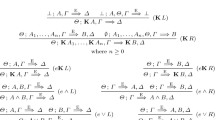Abstract
It is widely considered that Gödel’s and Rosser’s proofs of the incompleteness theorems are related to the Liar Paradox. Yablo’s paradox, a Liar-like paradox without self-reference, can also be used to prove Gödel’s first and second incompleteness theorems. We show that the situation with the formalization of Yablo’s paradox using Rosser’s provability predicate is different from that of Rosser’s proof. Namely, by using the technique of Guaspari and Solovay, we prove that the undecidability of each instance of Rosser-type formalizations of Yablo’s paradox for each consistent but not Σ1-sound theory is dependent on the choice of a standard proof predicate.
Similar content being viewed by others
Notes
Recently, Leach-Krouse [13] independently proved the existence of a standard proof predicate such that ∀ x∀y(Y R(x) ↔ Y R(y)) is provable.
This can be done since for any given formula, we can effectively find a Rosser-type Yablo formula of the formula.
Here the notation \(\bar {a}\) is ambiguous since a is formally a variable. In practice, \(\exists y > a \textsf {Th}_{T}^{R}\left (\ulcorner Y^{R}(\dot {y}) \urcorner \right )\) holds, and \(\textsf {Pr}_{\tau }\left (\ulcorner \exists y > \dot {a} \textsf { Th}_{T}^{R}\left (\ulcorner Y^{R}(\dot {y}) \urcorner \right ) \urcorner \right )\) is derived by the formalized Σ1-completeness.
References
Boolos, G. (1989). A new proof of the Gödel incompleteness theorem. Notices of the American Mathematical Society, 36, 388–390.
Boolos, G. (1993). The logic of provability. Cambridge: Cambridge University Press.
Cantini, A. (2009). Paradoxes, self-reference and truth in the 20th century. In D.M. Gabbay, J. Woods (Eds.), Handbook of the history of logic (vol. 5, pp. 875–1013). Amsterdam: Elsevier/North-Holland.
Chaitin, G.J. (1974). Information-theoretic limitations of formal systems. Journal of the Association for Computing Machinery, 21, 403–424.
Cieśliński, C., & Urbaniak, R. (2013). Gödelizing the Yablo sequence. Journal of Philosophical Logic, 42(5), 679–695.
Feferman, S. (1960). Arithmetization of metamathematics in a general setting. Fundamenta Mathematicae, 49, 35–92.
Gödel, K. (1931). Über formal unentscheidbare sätze der Principia Mathematica und verwandter systeme I (in German). Monatshefte für Mathematik und Physik, 38(1), 173–198, English translation in Kurt Gödel, Collected Works (vol. 1, pp. 145–195).
Guaspari, D., & Solovay, R.M. (1979). Rosser sentences. Annals of Mathematical Logic, 16(1), 81–99.
Kikuchi, M., & Kurahashi, T. (2011). Three short stories around Gödel’s incompleteness theorems (in Japanese). Journal of the Japan Association for Philosophy of Science, 38(2), 27–32.
Kikuchi, M., Kurahashi, T., Sakai, H. (2012). On proofs of the incompleteness theorems based on Berry’s paradox by Vopěnka, Chaitin, and Boolos. Mathematical Logic Quarterly, 58(4–5), 307–316.
Kritchman, S., & Raz, R. (2010). The surprise examination paradox and the second incompleteness theorem. Notices of the American Mathematical Society, 57(11), 1454–1458.
Kurahashi, T. (2013). Predicate provability logic and incompleteness theorems in formalized arithmetic. PhD thesis, Kobe University.
Leach-Krouse, G. (2013). Yablifying the Rosser sentence. Journal of Philosophical Logic. doi:10.1007/s10992-013-9291-5.
Lindström, P. (1997). Aspects of incompleteness. In Lecture Notes in Logic (vol. 10). Berlin: Springer-Verlag.
Priest, G. (1997). Yablo’s paradox. Analysis, 57(4), 236–242.
Rosser, B. (1936). Extensions of some theorems of Gödel and Church. The Journal of Symbolic Logic, 1(3), 87–91.
von Bülow, C. (2008). A remark on equivalent Rosser sentences. Annals of Pure and Applied Logic, 151, 62–67.
Vopěnka, P. (1966). A new proof of the Gödel’s result on non-provability of consistency. Bulletin de l’Académie Polonaise des Sciences. Série des Sciences Mathématiques, Astronomiques et Physiques, 14, 111–116.
Yablo, S. (1993). Paradox without self-reference. Analysis, 53(4), 251–252.
Acknowledgments
This work was supported by JSPS KAKENHI Grant Number 12J00654. This work is a part of the author’s dissertation [12], and the author is grateful to Makoto Kikuchi who is a supervisor of the dissertation. The author would also like to thank Hidenori Kurokawa for his helpful comments on the earlier version of this paper.
Author information
Authors and Affiliations
Corresponding author
Rights and permissions
About this article
Cite this article
Kurahashi, T. Rosser-Type Undecidable Sentences Based on Yablo’s Paradox. J Philos Logic 43, 999–1017 (2014). https://doi.org/10.1007/s10992-013-9309-z
Received:
Accepted:
Published:
Issue Date:
DOI: https://doi.org/10.1007/s10992-013-9309-z




